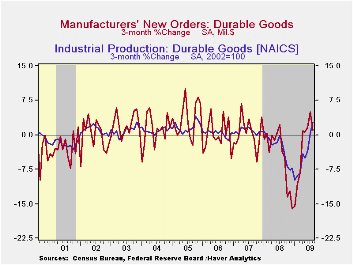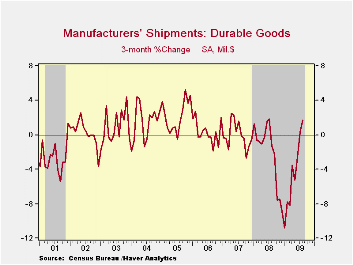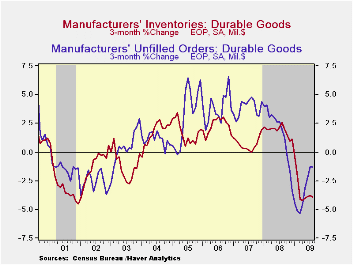 Global| Sep 25 2009
Global| Sep 25 2009U.S. Durable Goods Orders Decline Unexpectedly During August But Short-Term Trend Firms
by:Tom Moeller
|in:Economy in Brief
Summary
Durable goods orders declined unexpectedly last month and reversed half of the little-revised 4.8% jump during July. Virtually all of the August decline reflected lower orders for transportation equipment which gave back half of a [...]

Durable goods orders declined unexpectedly last month and reversed half of the little-revised 4.8% jump during July. Virtually all of the August decline reflected lower orders for transportation equipment which gave back half of a strong gain during the month earlier. Excluding transportation equipment durable goods orders slipped 0.0% after a 0.9% July increase.
Despite the recent monthly volatility, a picture of moderate recovery has emerged from the factory sector. Overall durable goods orders have risen 3.3% since their January low. Moreover, orders excluding transportation equipment since their April low are up 4.4%. These increases have given rise to two months of firm gains in factory sector industrial output of 1.4% and 0.6%.
Lower bookings for transportation equipment reversed half of a July increase with a 9.3% decline. A 29.9% (-21.4% y/y) drop in aircraft orders was to blame. Orders for motor vehicles & parts ticked up 0.4% (-23.3% y/y).
Only modest easing of orders in other industry groups was evident in last month's figures. New orders for computers and electronic products slipped 0.7% (-8.1% y/y) after three consecutive months of strong increase. Computer orders fell significantly for the second straight month (-9.6% y/y) but communications equipment orders increased for the second month (-11.8% y/y). Among other sectors machinery orders ticked up 0.7% (-29.3% y/y) after a hard 7.9% July decline while electrical equipment & appliance orders slipped 0.5% (-18.7% y/y) after a firm July gain. Primary metals posted a firm increase for the third consecutive month but remained off by one-third from the year ago level and fabricated metal products increased for the third straight month (-15.2% y/y).
New orders for nondefense capital goods fell a hard 7.1% and reversed all of their July increase as aircraft orders fell. Other capital goods orders slipped just 0.4% but they have risen by 6.5% since their April low.
Whatever firming there has been in durable goods orders has yet to show up much in shipments. They fell 1.4% last month (-17.8% y/y) after a 2.2% July increase and they were up just 1.6% from the May low. Computers & electronic products have led the shipments rise with a 5.5% three-month increase but machinery & electrical equipment shipments continued lower. Inventories of durable goods continued lower last month and posted a 1.3% decline which was their eighth consecutive down month (-8.9% y/y). Unfilled orders also continued lower (-10.8% y/y) as they have since last September.
The durable goods figures are available in Haver's USECON database.
Today's remarks by Fed Chairman Ben S. Bernanke can be found here.
| NAICS Classification (%) | August | July | June | Y/Y | 2008 | 2007 | 2006 |
|---|---|---|---|---|---|---|---|
| Durable Goods Orders | -2.4 | 4.8 | -1.1 | -20.2 | -5.8 | 1.4 | 6.2 |
| Excluding Transportation | -0.0 | 0.9 | 2.6 | -18.9 | -1.2 | -0.3 | 9.1 |
| Nondefense Capital Goods | -7.1 | 7.0 | -0.2 | -23.2 | -6.8 | 3.5 | 9.4 |
| Excluding Aircraft | -0.4 | -1.3 | 3.8 | -20.7 | -0.3 | -2.7 | 10.7 |
Tom Moeller
AuthorMore in Author Profile »Prior to joining Haver Analytics in 2000, Mr. Moeller worked as the Economist at Chancellor Capital Management from 1985 to 1999. There, he developed comprehensive economic forecasts and interpreted economic data for equity and fixed income portfolio managers. Also at Chancellor, Mr. Moeller worked as an equity analyst and was responsible for researching and rating companies in the economically sensitive automobile and housing industries for investment in Chancellor’s equity portfolio. Prior to joining Chancellor, Mr. Moeller was an Economist at Citibank from 1979 to 1984. He also analyzed pricing behavior in the metals industry for the Council on Wage and Price Stability in Washington, D.C. In 1999, Mr. Moeller received the award for most accurate forecast from the Forecasters' Club of New York. From 1990 to 1992 he was President of the New York Association for Business Economists. Mr. Moeller earned an M.B.A. in Finance from Fordham University, where he graduated in 1987. He holds a Bachelor of Arts in Economics from George Washington University.
More Economy in Brief
 Global| Feb 05 2026
Global| Feb 05 2026Charts of the Week: Balanced Policy, Resilient Data and AI Narratives
by:Andrew Cates






